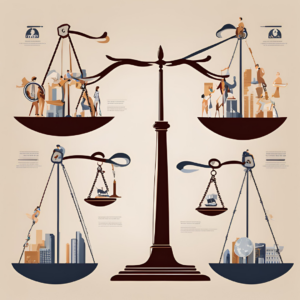Insolvency and Bankruptcy Code (IBC) 2016: A Landmark Economic Reform
The Insolvency and Bankruptcy Code (IBC) of 2016 is considered one of the most significant reforms in India’s economic landscape, described by Finance Minister Arun Jaitley as one of the most important economic reforms since independence, alongside GST. It addresses the gaps in commercial laws that emerged after globalization and liberalization in 1990, and aims to align economic and commercial laws to deal with insolvency issues effectively.
Key Features of the Code:
-
Comprehensive Legislation:
- The IBC is a unified law covering both corporate and individual insolvency, eliminating multiple judicial fora. It provides a streamlined and efficient process for insolvency resolution.
-
Bankruptcy and Economic Implications:
- The Code enables entrepreneurs to raise capital directly from the market, reducing dependence on banks. This shift could lead to a significant contribution to India’s global economic standing, particularly in the digital economy.
-
Order of Priority in Asset Distribution:
- The IBC defines the priority order for asset distribution in insolvency or liquidation:
- Insolvency-related costs.
- Secured creditors and workmen dues up to 24 months.
- Employee salaries/dues up to 12 months.
- Unsecured financial creditors.
- Government dues (up to 2 years).
- Remaining debts and dues.
- Preference shares.
- Equity shareholders.
- The IBC defines the priority order for asset distribution in insolvency or liquidation:
-
Who Can Initiate Insolvency Proceedings:
- Insolvency proceedings can be initiated by financial creditors, operational creditors (including the government, employees, or workmen), or the corporate debtor (company, members, partners, etc.).
-
Rights of Debenture/Bond Holders:
- Debenture and bond holders are classified as financial creditors and can initiate insolvency proceedings. Unsecured debentures are lower in priority (fourth in the list), while secured debentures enjoy priority over unsecured debts in liquidation.
-
Debenture Trustee’s Role:
- Under the IBC, debenture trustees cannot directly initiate insolvency proceedings. However, courts may interpret the term “financial creditors” to include trustees, allowing them to act on behalf of debenture holders.
-
Rights of Shareholders:
- Preference shares and equity shareholders have lower priority in insolvency proceedings, but they do play a role in the insolvency resolution process. Shareholders may participate in committee meetings but lack voting power unless key decisions (e.g., asset sales, restructuring, reclassification of promoters) are involved, which require shareholder approval.
-
Role of Investors in the Resolution Plan:
- After the appointment of an Interim Insolvency Professional, a Committee of Creditors (primarily financial creditors, including debenture holders) is formed to put forward a resolution plan. Shareholders have a significant say in the resolution plan, especially in restructuring and selling company assets. However, the IBC regulations stipulate that shareholder approval is necessary for key decisions, such as selling assets exceeding 10% of the company’s turnover or reclassifying promoters.
-
Impact on Investor Confidence:
- The IBC’s transparent and efficient framework boosts investor confidence by ensuring that creditors can quickly initiate insolvency proceedings and recover their dues. This provision is expected to increase foreign investments and loans in India by providing a quicker exit route for investors in case of default.
-
Corporate Governance:
- The IBC promotes better corporate governance, ensuring that promoters and company management are accountable for their actions and decisions during the insolvency resolution process.
The Insolvency and Bankruptcy Code offers a much-needed overhaul of India’s insolvency framework, ensuring a faster, more transparent resolution process. Its comprehensive coverage of both corporate and individual insolvency, coupled with clear rules on creditor priorities and investor rights, is expected to build greater trust in India’s corporate sector. By enabling swift liquidation and restructuring, the Code holds the potential to significantly boost investor confidence, increase foreign investment, and enhance corporate governance standards across India.



